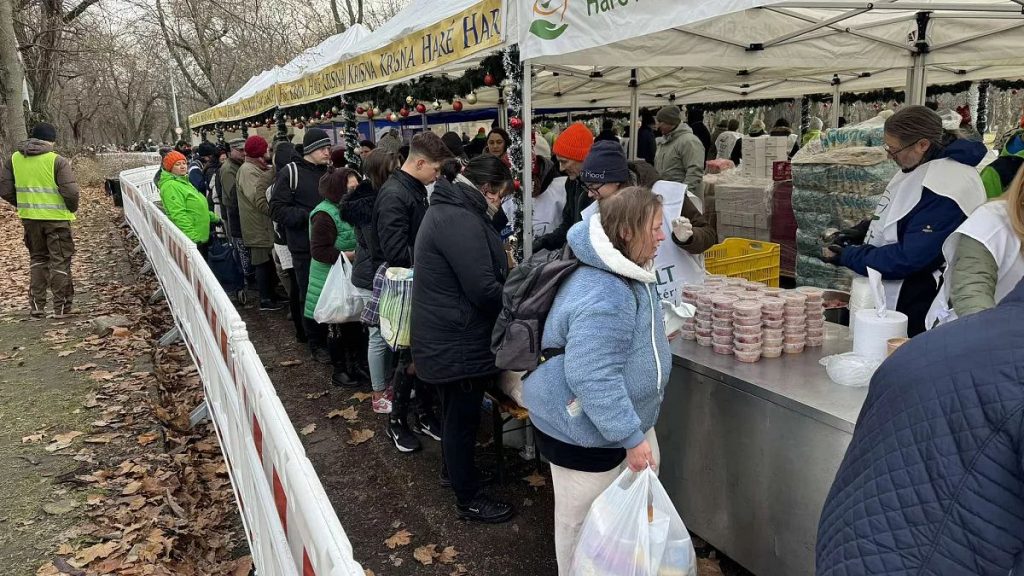The Hungarian Krishna community orchestrated a remarkable display of compassion and generosity this Christmas, extending a helping hand to thousands in need across Budapest. Their annual “Food for Life” program, amplified for the holiday season, provided not just sustenance but also a glimmer of hope to a diverse population struggling amidst economic hardship. The centerpiece of this effort was the distribution of 2,500 hot meals on Christmas morning, a feat surpassing their previous endeavors. The meals, consisting of traditional Hungarian cabbage stew and warming tea, were a welcome respite from the winter chill and a much-needed source of nourishment for many.
The distribution strategy effectively reached both concentrated populations of homeless individuals within shelters and those dispersed within the community. One thousand meals were delivered directly to local homeless shelters, ensuring that this vulnerable population had access to a warm Christmas meal. An additional 1,500 meals were served in Népliget Park, a public space in Budapest, catering to a broader range of individuals and families facing financial difficulties. This two-pronged approach maximized the reach of their efforts, demonstrating a thoughtful consideration for the varying circumstances of those they sought to assist.
Beyond the immediate comfort of a hot meal, the Krishna community also distributed small gift packages to each recipient, further enhancing the sense of care and community. These packages included organic pumpkins grown in the Krishna Valley, a symbolic gesture of abundance and nourishment. The gifts, supplemented by generous donations from various contributors, added a personal touch to the initiative, reminding recipients that they were seen and valued during a challenging time. This act of giving extended beyond mere material sustenance, fostering a sense of belonging and shared humanity during the festive season.
The success of this initiative was significantly bolstered by the active participation of the wider community. Shoppers at local supermarkets contributed generously to the cause, donating non-perishable food items such as flour, chocolate, and canned goods. Collection baskets placed strategically within supermarkets provided a convenient and accessible way for individuals to contribute to the Krishna community’s efforts. This collaborative approach underscored the collective responsibility within the community to address the growing issue of food insecurity, highlighting the power of collective action in times of need. The organizer, Csilla Szilaj Péterné, emphasized the importance of these public donations, highlighting the community’s shared commitment to helping those less fortunate.
The increasing demand for food assistance in Hungary points to a deeper societal challenge, with more and more people falling into precarious financial situations. Rising housing costs, coupled with persistent inflation and inadequate social benefits, have created a perfect storm, pushing individuals and families towards the brink. The queues for food distributions are no longer solely comprised of the chronically homeless; they now include a growing number of middle-class families and retirees struggling to make ends meet. The willingness of these individuals to endure long waits in the cold weather for a hot meal speaks volumes about the severity of their economic struggles, underscoring the urgency of providing support.
The Krishna community’s “Food for Life” program extends beyond the Christmas period, operating from December through January to provide continued support when it is most needed. This extended timeline is crucial, as many other charitable organizations conclude their holiday food drives after Christmas Eve, leaving a gap in services for those reliant on assistance. By continuing their efforts into January, the Krishna community fills a critical void, ensuring that vulnerable individuals and families have access to nourishment during the harsh winter months. Their commitment reflects a deep understanding of the ongoing challenges faced by those they serve, emphasizing the importance of sustained support in addressing the complex issue of food insecurity. The program’s ability to reach up to 10,000 people throughout this period underscores the significant impact of their dedicated and compassionate service.

